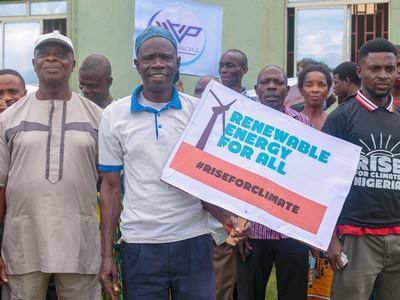
In October 2018, the Intergovernmental Panel on Climate Change (IPCC) published a special report highlighting the increased urgency of limiting global warming to below 1.5°C above pre-industrial levels. Switching to sustainable and efficient energy systems globally is crucial to achieving the 2015 Paris Agreement signed by the EU and other 194 countries.
The EU, by being committed to fully implement the Agenda 2030, aims to support the delivery of Sustainable Development Goal (SDG) 7 on ensuring affordable, reliable, sustainable and modern energy for all by 2030. Supporting energy access with decentralized and renewable energy systems does not only have environmental benefits but addresses inequalities and contributes to the eradication of poverty. Therefore, development and climate finance from donor countries like the EU has a vital role to play in implementing the Paris Agreement and SDG 7.
Is EU support for energy in developing countries fully aligned with its climate and sustainable development objectives?
In 2018, CIDSE commissioned the Overseas Development Institute (ODI) to analyse EU institutional support for energy disbursed between 2010-2016, including Overseas Development Aid (ODA) and other official support via the European Investment Bank (EIB). The aim was to obtain a clear picture of whether EU energy support in developing countries is aligned with its climate and SDG commitments.
Overall, the study confirms that the EU provides a significant amount of support for energy in developing countries – well over $9 billion in the period analysed. However, it is concerning that although more EU’s support goes to renewable energy, the EU still provides a significant amount of support for fossil fuels in developing countries – over $2 billion in the period analysed.
Furthermore, the poorest countries, and countries with the largest population without modern energy (HICs – High Impact Countries), received only a small amount of EU support, representing a tiny proportion – just 5% – of its total energy support.
Therefore, given that one overarching objective of the Paris Agreement is to ‘make finance flows consistent with a pathway towards low greenhouse gas emissions and climate-resilient development’, the EU has a responsibility to ensure that all its international public finance aligns with its climate and SDG commitments and promotes a ‘leaves no-one behind’ approach, including its energy support.
In a new briefing, CIDSE, together with CAFOD, Geres and Hivos, highlight several recommendations in order to ensure that the EU’s energy support in developing countries is aligned with its policy commitments:
- Make an immediate commitment to phasing out all EU support for fossil fuels, with support for coal defunded immediately, and to scale up renewable energy (RE) and electricity energy (EE). This should apply to all energy support channelled through the new NDICI.
- Adopt a ‘whole portfolio’ investment approach to ensure all forms of energy support via all channels, ODA and non-ODA.
- Ensure robust screening of individual energy investments, with safeguards for identifying and mitigating climate, environmental and human rights risks.
- Prioritise energy investments in poor countries most in need of international support to transition to low carbon energy systems.
- Significantly scale up support for energy access as a proportion of total EU energy support and prioritise investment in ‘High Impact Countries (HICs)’ and Least Developed Countries (LDCs).
- Scale up investments in distributed renewable energy (DRE) and clean and efficient cooking solutions, as the least-cost options to reach most people living in energy poverty.
- Ensure equal priority is given to clean cooking and support targeted strategies to address the gendered aspects of energy poverty.
- Invest more in for research, demonstration and scale-up of innovative ‘last mile’ energy access financing and business models and enabling environment support, including more inclusive energy service planning and delivery.
- Develop more consistent and transparent reporting on its energy support through the OECD’s Creditor Reporting System (CRS) – and encourage peers to do the same – so that the stages of energy delivery and energy sources supported can be easily tracked.
- Work with other development actors to operationalise more impact-focussed metrics for energy access investments, such as the World Bank’s Global Tracking Framework (GTF).
Contact: Giulia Bondi, Climate Justice and Energy Officer (bondi(at)cidse.org)
